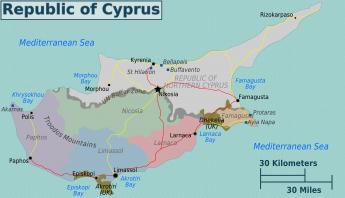Related Topics
Right Angle Club: 2013
Reflections about the 91st year of the Club's existence. Delivered for the annual President's dinner at The Philadelphia Club, January 17, 2014.
George Ross Fisher, scribe.
The European Union
New topic 2013-11-19 21:20:53 description
Ruminations About the Cyprus Crash

|
| Map of Cyprus |
The Cyprus banking crisis of 2013 affected thousands of people, some of them very severely, and reached billions of dollars in consequences. But in the scheme of world banking, it was a pretty small event. Its truly serious consequences may lie in the precedents it sets, or the contagion it ignites. It is too soon to know what the full consequences may be, but some pretty serious possibilities are quite evident. The crash was partly the fault of Cypriotes themselves, and partly the result of Russian flight capital overturning a small banking system which could not handle it. The Cypriotes' fault? Sure, it must have been a temptation for a Paradise Island to imagine it could become another Luxembourg or Switzerland. Or Monaco or the State of Delaware for that matter, all seeking to profit from weak spots in the planning of larger neighbors. In any event, it was inevitable that Cyprus will blame the Russians, and the Russians will blame the Cypriotes; in the early reports, it was hard to tell which was the main villain. After that gets clarified, surely the real blame will be transferred to flaws in the design of the Eurozone. On every side, short-term expedients kicked the can down the road, sacrificing sound banking principles to politics. Perhaps it will turn out it had been a good thing to have the smallest participants in European union turn out to be its weakest link, breaking down while repair was still able to contain it.
The European central bank and the International Monetary Fund demanded certain conditions before lending their own money for a bailout. Without much doubt, they canvassed the views of the larger nations in the European Union before doing so. Since Russia is not a member of the EU, to some degree its point of view was probably "neglected". The bailout would not be forthcoming unless the stockholders were wiped out and the major depositors assessed. The stockholders were, in theory, able to elect directors, who were, in theory, able to appoint the bank managers, who were responsible for the banks' contribution to the mess. In addition, it was demanded that the depositors in the banks contribute to the losses. Without much doubt, the mindset of the bailout was that the rich (Russian) depositors were evading local laws by moving to foreign banks, which in this case were supported by the wealth of the whole common market, not just the nation of Cyprus. Therefore, punishing the depositors had the effect of discouraging any future money-laundering which might hope for the financial support of large EU economies, who at present tolerate loopholes created by small EU members. Only depositors of more than $100,000 would be taxed, which would mostly capture non-voting, non-Cypriote depositors, but a 40% assessment is closer to a confiscation than a tax. Since by eurozone rules depositors of less than $100,000 are fully insured, the threshold is completely meaningless, but among populists can be reassuringly termed a tax on depositors who are rich enough to be uninsured. Its confiscatory nature is acknowledged by exchanging the assessment for common stock in the bank since taxes do not normally receive considerations in return. Since the other stockholders were wiped out, the mostly Russian large depositors now appear to own the bank. That surely cannot be the intention, so further modification must be expected.
So there's the first problem to be adjusted: how can the European Union avoid turning the entire banking system of one of its members over to citizens of a non-member nation? Ignoring for the moment the fairly recent Russian disregard for private property, the problems of coordinating the rules of euro banking with the rules of a non-member owner of the whole banking system of a euro member, are fairly daunting. They probably rise to the level of coaxing Germany and Finland into swallowing their pride and bailing out Cyprus, after all. Or persuading France and other advocates of European Union to eject Cyprus from the arrangement, which accords with the opinion of a large number of Cypriotes as well. The problem seems to be this: either a full European bailout or a total ejection of Cyprus seems feasible, but any intermediate compromise triggers consequences which are impossible to assess.
Many other problems are imaginable, as well. For instance, how can a price be assigned to the stock of the banks? Set too high, the former owners will protest they have been fleeced by illegal application of bankruptcy powers. Set too low, the "compensation" would become a windfall for the Russian depositors it was intended to punish. Set too high, the drop in price at the time of future market sales would trigger endless lawsuits in the courts of several nations. This difficulty might be circumvented by making the stock non-transferrable, or salable only to the Cypriote government, both of which would be precedents quite difficult to integrate into a uniform euro zone set of policies, and present a permanent set of future headaches for the evolution of the system. Since the overall plan is to achieve eventual political union by first creating a financial brotherhood, little Cyprus would acquire a permanent voice to which it would not ordinarily be entitled.
REFERENCES
| Bitter Lemons: Lawrence Durrell: ISBN-13: 978-1604190045 | Amazon |
Originally published: Wednesday, March 20, 2013; most-recently modified: Friday, May 31, 2019